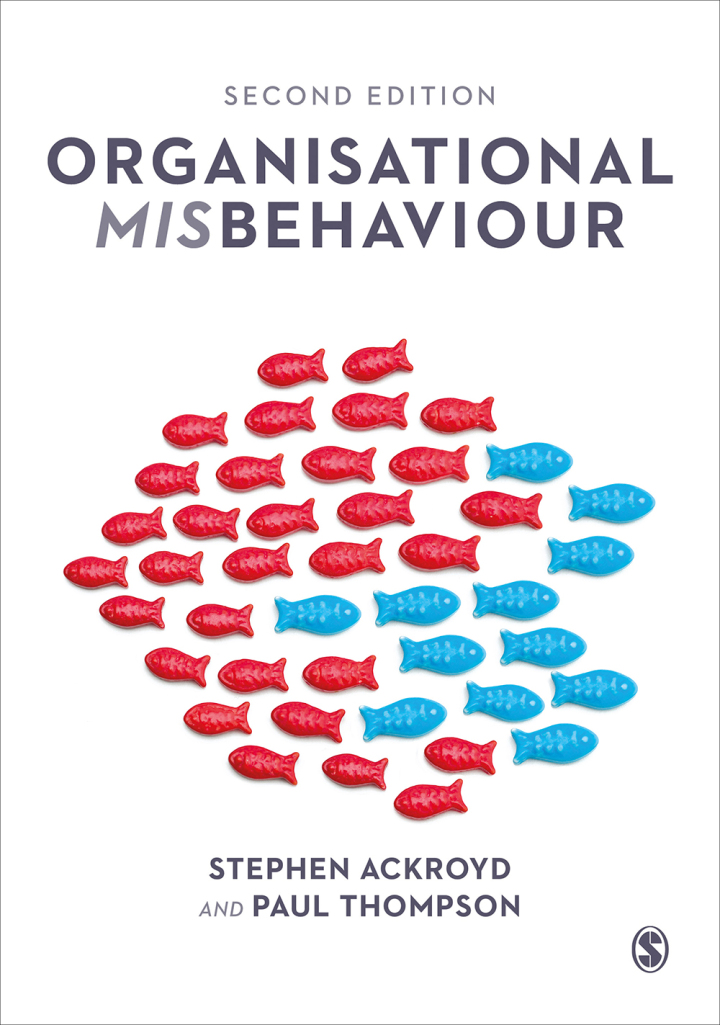
Organisational Misbehaviour 2nd Edition
PUBLISHER: Sage
Trường ĐH, Nhóm, Thư Viện: Gọi 0915920514 để báo giá eBook hosting trên Vital Source hoặc mua Sách In
Hành vi sai trái về mặt tổ chứcHành vi sai trái tại nơi làm việc thường tập trung vào việc hạn chế công việc, ăn trộm, vắng mặt và phá hoại. Những điều này vẫn quan trọng, nhưng bối cảnh tổ chức đang thay đổi. Từ các hình thức hài hước châm biếm mới và việc sử dụng mạng xã hội, bắt nạt nơi làm việc và hành vi sai trái về tình dục, đến hành vi sai trái trong quản lý và hậu quả của nó, ấn bản thứ hai của Hành vi sai trái trong tổ chức khám phá các hình thức lật đổ tổ chức mới nhất và đưa ra những hiểu biết mới về động lực cơ bản của quản lý và tổ chức. quá trình. Rút ra từ nghiên cứu đương đại, văn bản có thẩm quyền này phù hợp cho bất kỳ ai quan tâm đến việc nghiên cứu về quản lý, công việc và tổ chức. Stephen Ackroyd là Giáo sư danh dự tại Trường Quản lý thuộc Đại học Lancaster, Vương quốc Anh. Paul Thompson là Giáo sư danh dự về Nghiên cứu Việc làm tại Đại học Stirling, Vương quốc Anh.
About the AuthorsAcknowledgementsIntroduction: Why a Second Edition and What’s in ItPART I THE DISCIPLINARY FOUNDATIONS OF MISBEHAVIOUR1 The Recalcitrant Worker: Historical Roots and Contemporary DevelopmentsSoldiers of fortuneRational ‘man’Industrial deviantsBreaking up is hard to do: Rediscovering sabotageTime off for bad behaviourRebels without a cause?Unwilling womenConclusion2 Assessing Approaches to Organisational MisbehaviourScientific managementHuman relations studiesFrom complacency to concernThe new orthodoxy in understanding misbehaviourThe location of misbehaviour: Contemporary organisationsPART II THE RELATIONAL APPROACH TO ORGANISATIONAL MISBEHAVIOUR3 Irresponsible Autonomy: The Infrastructure of MisbehaviourThe Self-Organisation of GroupsResponsible AutonomyIrresponsible Autonomy 1: The Primacy Of Group IdentityThe Micro Politics Of GroupsIrresponsible Autonomy 2: The Effort BargainThe Present And Future Of Self-OrganisationThe Question Of SolidarityConcluding Comments4 Manageability and Managerial Regimes: Confronting and Containing MisbehaviourIntroductionThe complicity of managementManagerial discretion: the case of pilferageThe dynamics of direct control regimesThe dynamics of direct control regimesThe dilemma of direct control regimesManagerial regimes: definitions, types and scopePhase one: a partial break from fordism and taylorismPhase two: financialisation, market restructuring and its consequences5 Strategic Organisational Change: Corporate Management MisbehaviourIntroductionCorporate changeManagement crime, wrongdoing and misbehaviourChanges in the status and power of corporate managersFocusing on specific managerial MisbehaviourCorporate elites and inequalityThe transmission chain:ConclusionPART III DEVELOPMENTS IN WORKER MISBEHAVIOUR6 Only Joking: From Sub-Culture to Counter-Culture in Organisational RelationsIntroduction: the characteristics and functions of humour at workA change of directionEven more subversive behaviourThree kinds of applied joking at workBring on the clownsPlease don’t teaseManagerial use of humourSatire: from the latin satura, to stuffDeconstructing DilbertSatire and its limitsConcluding comments: humour and identity7 Social Media: A New Contested TerrainThe bigger picture: the political economy of social mediaEnter and exit the workplaceManagerial intervention and the private conduct of employeesPolicy directionsSocial media and solidaritySome final remarks8 Ruling Passions: Sexual Misbehaviour at WorkIntroductionThe traditional divide between public and private in theory and practiceOrganisations and sexualityRegulating sexual misbehaviourA concluding comment9 Bully for You: Coercion and its Consequences in the Contemporary WorkplaceChanging definitions and scopePsychopathological approaches to bullyingExplaining the rise of bullyingA different explanatory strategy: putting relationships firstThe organisation of the labour processConclusions: the paradoxes of policy and practiceCONCLUSIONS AND REFLECTIONS10 Resistance: Debates, Departures and New DirectionsIntroductionFrom hero to zero and back again: the resistance debate revisitedChanges in managerial regimes and spaces for innovative misbehaviourRecognising and unpacking disengagementFrom recalcitrance to solidarities: pathways between oppositional PracticesReferencesIndex















